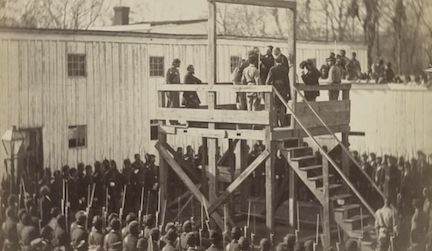The Deadline for the Soul
The word “deadline” has an interesting, and oft, well, “deadly” history.
Earliest occurrences of the word seemed to have referenced a fishing angler’s weighted line which would hang perfectly still, or “dead” in the water, bait attached, to attract unsuspecting fish who, upon biting such line, would soon find themselves also “dead.”
Its meaning was later expanded to refer to any fixed or immovable line.
But it was the ravages of war which would give the word its next iteration. Enter one infamous Confederate Civil War prison commander, Henry Wirz, responsible for the operations at the notorious Confederate prison at Andersonville, Georgia.
In 1864, Wirz was put in control of Camp Sumter, a newly-established internment camp for Union soldiers located near Andersonville in rural Georgia. Over the remaining 14 months of the war, Camp Sumter grew to become one of the largest prisoner of war camps in the entire Confederacy. At its peak, it held more than 30,000 Union prisoners, all of whom shared an enormous 16.5-acre open-air paddock—conditions inside of which were notoriously grim. Disease and malnutrition were rife, and a lack of clean water, warm clothing, and adequate sanitation led to the deaths of many of the camp’s prisoners. Of the 45,000 Union prisoners held in the Camp at one time or another, it is estimated that almost a third succumbed to Sumter’s squalid and inhumane conditions.
But wait, there’s more. One of most damning examples of his inhumanity was his implementation of what became known as the Camp’s deadline:
“ … a line around the inner face of the stockade or wall enclosing said prison, and about twenty feet distant and within said stockade; and so established said dead line, which was in many places an imaginary line, in many other places marked by insecure and shifting strips of [boards nailed] upon the tops of small and insecure stakes or posts, he … instructed the prison guard stationed around the top of said stockade to fire upon and kill any of the prisoners aforesaid who might touch, fall upon, pass over or under or across the said “dead line ... “ — Report of the Secretary of War, October 1865
Wirz must have been deemed to have of “crossed the line” of human decency, because he was found guilty of war crimes, and was hanged on the November 10, 1865.

*Execution of Captain Henry Wirz in 1865 / Library of Congress
By the early 20th century, with its wartime inhumanity connotations nothing more than a speck in American culture’s rear view mirror, a new meaning emerged from the pages rapidly churning off journalistic printing presses.
Printers used the word to describe that point at the bottom of a type case (printing tray), below which typeset could not be added. It was the "deadline" on the tray. Journalists, rushing to get their stories to press, competed to get space on the page before the “deadline” was "set" and there was no more room to include another story.

While the typesetting machines of the early 20th century are likewise but a speck in our rear view windows, the connotation of the term has since stuck and expanded. Today, the word deadline is used broadly to refer to any date or time by which something must be accomplished.
It may no longer exclusively refer to matters of life and death, but urgency is still at the core of its meaning.
In spiritual terms, there is a deadline looming over each one of us which does indeed bear life and death consequences. In fact, this deadline is itself a choice between life (eternal!) and death. Only in this case, we do not know when or how the deadline will present itself.
God has told us in His Word that it is “appointed for man to die once, and after that comes judgment” (Hebrews 9:27, ESV). He has likewise told us that we must choose “this day” whom we will serve (Joshua 24:15); “… behold, now is the accepted time; behold, now is the day of salvation (2 Corinthians 6:2, NKJV).
None can possibly know when that deadline will come. As such, don’t delay another moment. “[As] Christ’s ambassadors, as though God were making his appeal through us. We implore you on Christ’s behalf: Be reconciled to God! (2 Corinthians 5:20, NIV), TODAY!
Sleeping With One Eye Open
Ever felt the need to sleep with one eye open? Too bad it's impossible. Or is it?
Unihemispheric slow-wave sleep is an actual phenomenon in nature whereby a creature can split its consciousness in two, with one half its brain sleeping while the other remains wakeful.
A great example is found in seals. While in unihemispheric sleep, they literally keep one eye opened and the other eye closed! "This half-brain sleep only occurs while they are in the water, but when they come up to sleep on land, they sleep with their whole brains turned off like humans."
Note: Other examples of animals which engage in unihemispheric sleep are mallard ducks, peregrine falcons, porpoises, sea lions and dolphins.
The Lord has called us to be watchful and wakeful as we await His return. Obviously, we can't literally stay awake 24/7. But we can sleep with one eye open, so to speak, always conscious and aware that He could return at any moment. Don't behave like beached seals who "sleep with their whole brains turned off."
"For you know quite well that the day of the Lord's return will come unexpectedly, like a thief in the night. … So be on your guard, not asleep like the others. Stay alert and be clearheaded" (1 Thessalonians 5:2, 6, NLT).
Wrestling The Impossible
Success guru Bob Harrison shares the story of a twelve year old by who was snorkeling in a river when he was bitten on the head by an alligator:
Seeing the emergency, the boy's mother reached out and yanked her son from the moth of the eleven-foot alligator. The ensuing struggle broke the child's leg but saved his life.
In times of emergency, many people somehow receive the courage and ability to do what is seemingly impossible. However, in the normal course of life, if something seems too difficult for them or when they are confronted with what seems impossible, they either don't try or they give up.
Bob Harrison is a Best-selling author and noted seminar/conference speaker. His motivational teachings on "success" have been shared with thousands of seminar groups, churches, conferences, companies, and television audiences worldwide.
Could it be that your problem isn't the impossible task before you as much as the lack of urgency within you?
"Be strong and very courageous. Be careful to obey all the law my servant Moses gave you; do not turn from it to the right or to the left, that you may be successful wherever you go" (Joshua 1:7).
Alternative Application:
What if we where as urgent about saving souls as this mother was about saving her son?
"Preach the Word; be prepared in season and out of season; correct, rebuke and encourage--with great patience and careful instruction" (2 Timothy 4:2).
Illustration Exchange